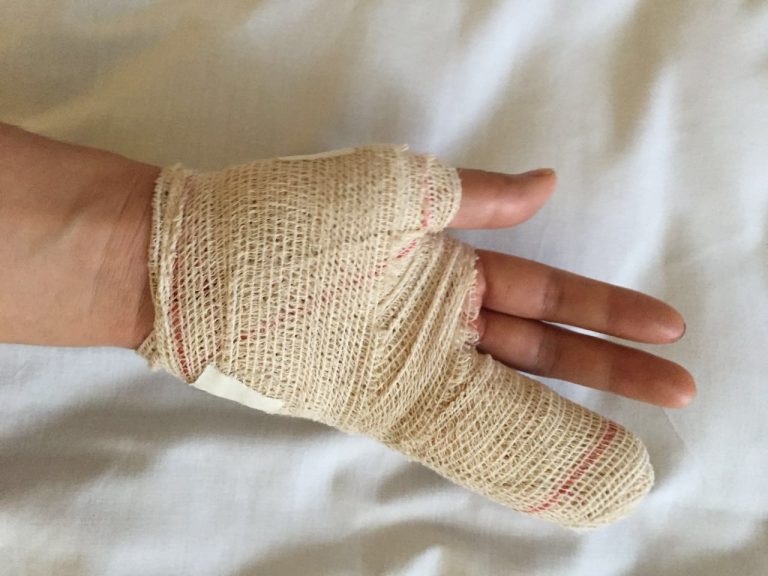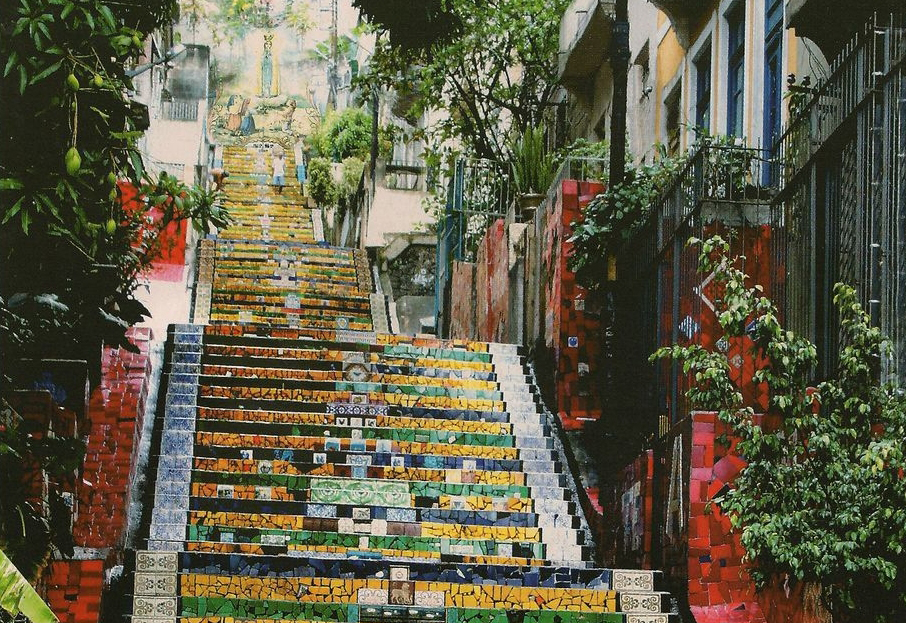What if Qiang Xin had not stayed in Rio de Janeiro after his academic conference? What if he had not decided to visit the Catedral Metropolitana? He still wonders about this, even a year after his visit.
De fameuze Escadaria Selarón fleuren de wijk Lapa wat op. (Foto: Wiki Commons)
Rio de Janeiro. Samba city. City of the immense statue of Christ on Mount Corcovado and the waving palms of Copacabana beach. TU Delft researcher Qiang Xin was looking forward to visiting Rio for the annual conference on his discipline last year. Only three months earlier, in August, the Olympic Games were held in this city.
As a young scientist from China, Qiang had heard that Beijing had improved tremendously in terms of cultural activities and infrastructure after hosting the Games in 2008. How would that be in Rio? This was one of his reasons to book some extra days and explore the city after the conference, not knowing that the corporate social work of TU Delft would refer to his experiences as ‘psychological trauma’ in the next annual report, although briefly and anonymously.
On Sunday, October 30th 2016, Qiang arrives in the Brazilian million city. It is his first visit to the South American continent. Luckily, the conference is held at a beautiful location near Barra da Tijuca beach, in the Convention Centre of the luxury Windsor Oceanico Hotel. From Tuesday, November 1st until Friday November 4th, he attends the conference. He presents his paper and meets new colleagues and old friends. There is nothing wrong.
Some local people shout at him and point at something, but Qiang does not understand Portuguese
When the conference is over, Qiang’s colleagues take their flights to Delft. Qiang stays alone in Rio. He plans to visit the Escadaria Selarón at the weekend. These are stairs which the Chilean artist Jorge Selarón has covered with colourful tiles to brighten the neighbourhood. They have become a famous attraction and connect the district of Santa Teresa with the lower district, Lapa.
Unfortunately, on Saturday thunderstorms bring heavy rains. Qiang decides to work and relax in his hotel room instead. The next morning is bright. The weather forecast predicts maximum temperatures of 27 degrees Celsius. So, after breakfast Qiang takes an Uber taxi to Lapa. That is safer, he had heard.
After the taxi drive, he puts his dark blue backpack on his shoulders and strolls to the stairs. Some local people shout at him and point at something, but Qiang does not understand Portuguese. He ignores them. He should have taken this as a warning, he finds out afterwards.
The stairs at the Rua Joaquim Silva form a colourful mosaic of mostly blue, yellow and green tiles, after the colours of the Brazilian flag. The side walls consist of blood red tiles with even some Delft blue ones. Qiang takes a lot of snapshots.


Around eleven or eleven thirty he decides to visit the pyramid-shaped modern Catedral Metropolitana. The 75 metre high building is called after Saint Sebastião, who was shot with arrows for his belief.
Qiang grabs his mobile and sees on Google Maps that it is just a short walk if he takes the Ladeira de Santa Teresa. He walks into the dingy alley that leads downwards. Two girls, tourists as well, walk behind him. The walls of the grey street are clad with graffiti. Some locals are walking around and Qiang passes a woman who is just getting into her car.
Just after a turn, Qiang sees a man walking towards him. When he is only one or two metres away, the man suddenly grabs a hidden empty bottle of Heineken beer from his waist and tries to hit Qiang over the head with it. In an instant, Qiang uses both hands to defend his head. He manages to ward off the blow, but the bottle breaks on his right hand. For a moment he doesn’t feel anything, but blood splashes on his shirt, trousers and shoes.
Before the man can strike again, Qiang hears a driver honking his horn to scare the attacker away. It is the woman who just got into her car. The robber turns around and runs down the street. The two girls behind Qiang run away. So disappointing, he thinks. Without saying anything the woman in the car drives away. Qiang is in shock and sits down on the ground. He sees his hands are bleeding. The glass has cut his pinkies and ring fingers and he sees a white piece of tendon in his left hand. His clothes are torn.
The small, temporary police station in a kind of construction container is specially for tourists
A second car arrives. “Help! Can you help me?” The driver opens a window and gives Qiang some wet wipes, driving away without saying anything. Qiang wraps his wounds with the tissues to stop the bleeding. He sees some local residents running out of their houses. A woman tells him he should go to the police station. It is located around the corner at the end of the street, in the same direction the robber had fled.
The woman walks Qiang to the police station. It appears to be a small, temporary police station in a kind of construction container. It is specially for tourists. As well as he can, Qiang tells a handful of policemen what happened to him. Via Google Translate, from English to Portuguese. Only one of the policemen speaks English and advises Qiang to calm down and wait for the ambulance. Do they think this is normal? Qiang waits and feels blood flowing down his neck. Is his head hurt? No, fortunately it is only a small piece of his left ear lobe that is cut off.
Qiang calls his family in China. His mother is in shock and tells him to phone the embassies of China and The Netherlands. Nobody answers. When the ambulance arrives forty minutes later, Qiang asks the nurse and policemen to walk back with him, to the place of the attempted robbery. At around house number 35 he finds his USB stick and keyring on the ground. They had fallen out of his backpack. Qiang himself takes pictures for the police.


Lying in the ambulance, he also takes pictures of his bloodied pants and shoes. When he is delivered to the Souza Aguiar municipal hospital, he is given a tetanus injection and antibiotics. After that he has to wait. All alone, far from home, he has to wait and wait. For four hours, he waits in the hospital, because other people have far worse injuries than he. Would it be better go to a private hospital? He decides to call his Brazilian colleague, Danilo Menegos in Delft.
Danilo is really shocked and immediately calls his cousin in Brazil. He hears that the doctors in the Souza Aguiar are very good at treating stab and bullet wounds, because they do this so often. They see a lot of people with worse wounds than Qiang’s. On the other hand, the infrastructure and the hospital itself are bad. So bad that Danilo can imagine it triggering a new trauma. Still, it seems better for Qiang to stay where he is, because driving to another hospital takes time too.
When Danilo rings back, Qiang has already had some stitches in his ear. The doctor has told him that because Qiang is a foreigner, he only needs to wait two hours. There are shards of glass in his hands and he appears to have a broken bone in his right hand. He cannot move his right pinky. His left pinky is broken too, just as is the tip of his ring finger. After a three-hour operation the doctor plasters them.


Out of the operation room, Qiang sees Danilo’s two cousins waiting for him. They talk with the nurse and doctor and bring Qiang to the pharmacy and, finally, to his hotel room. Safe again, Qiang realises he was lucky that his wounds were not fatal. He is grateful to have had an operation and looks at the bright side of life. At last, everything is under control, isn’t it?
He decides to report to the police the next day. Danilo’s cousins tell him where he should go and offer to accompany him, but Qiang thinks it is too much to ask on their working day. There is a long queue in the police station. Qiang is surprised by the fact that every half hour someone reports a robbery.
When it’s his turn, Qiang has to describe the man who attacked him. ‘Around 30 years old, brown skin, short black hair, light green shirt, white or cinnamon coloured shorts,’ the policeman writes in a report. He shows Qiang a book full of pictures of suspects. It’s difficult. Everybody has short hair. After three hours, Qiang is ready to go back to his hotel. He stays inside until his flight, the next night.
His colleagues advise him to go to the TU Delft’s corporate doctor
Back in Delft, Qiang worries about having a trauma. His colleagues advise him to go to the TU Delft’s corporate doctor, who advises Qiang to go to the corporate social worker and to work only ten percent of his total hours. Qiang however, can focus well and works more. Being in his normal working environment and talking to his colleagues really do help him to recover. That is what the company’s social work recommends: talk about it. It also helps him implicitly, because he feels the warmth of his colleagues.
Now, almost a year later, Qiang cannot bend his left pinky completely due to scar tissue in his tendon. He still needs exercises from the physiotherapist, but it’s already a lot better. Qiang is now more careful. When he goes to unfamiliar places, he first looks at whether it’s safe or if there are suspicious people. To Brazil, he would only go with others. Not alone.
Sometimes he wonders how it would have been, if he had not gone to Rio. What if he had not decided to go to the cathedral? Supposedly a place of peace! But hey, you cannot turn back time. Qiang tries to see the positive side: his head was not touched and the woman drove along right on time. That is life. You have to deal with it.
For reasons of privacy, the names Qiang Xin and Danilo Menegos are fictitious.
Three tips from Qiang Xin when you experience traumatic events:
- Accept what happened to you. ‘What if’ questions do not make sense, you cannot turn back time.
- Accept all the help that others offer, even if you think it will not help.
- Share your story. Do not hide it deep inside.
Do you have a question or comment about this article?
c.j.c.vanuffelen@tudelft.nl


Comments are closed.